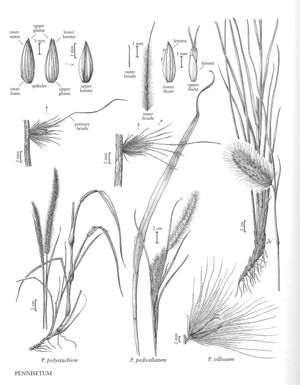Pennisetum villosum
Plants perennial; rhizomatous. Culms 16-75 cm, erect; nodes glabrous. Sheaths glabrous, margins ciliate; ligules 1-1.3 mm; blades 5-40 cm long, 2-4.5 mm wide, flat to folded, glabrous, pubescent, or scabrous, margins ciliate or glabrous basally. Panicles terminal, 4-11.5 cm long, 50-75 mm wide, fully exerted from the sheaths, erect, white; rachises terete, pubescent (basally). Fascicles 7-11 per cm; fascicle axes 1.5-2.5 mm, with 1-4 spikelets; outer bristles (0)1-8, 1-13.5 mm; inner bristles 23-41, 13-50.5 mm, densely plumose; primary bristles 40-50 mm, ciliate, usually not noticeably longer than the other bristles. Spikelets 9-12 mm, glabrous; pedicels 0.1-0.4 mm; lower glumes 0.3-1.3 mm, veinless; upper glumes 2.5-5.2 mm, 1(3)-veined; lower florets staminate or sterile; lower lemmas 7.5-10.5 mm, 7-9(10)-veined; lower paleas absent or 5.5-8.5 mm; anthers absent or 3.8-4.5 mm; upper lemmas 9-11 mm, 7-veined, apices scabridulous; anthers 3.5-5 mm. Caryopses concealed by the lemma and palea at maturity. 2n = 45.
Distribution
Colo., N.Mex., Tex., Calif., Mich., Pacific Islands (Hawaii), Ga., Ariz.
Discussion
Pennisetum villosum is native to Ethiopia, northern Somalia, and the Arabian Peninsula. It is grown as an ornamental in the Flora region.
Selected References
None.
